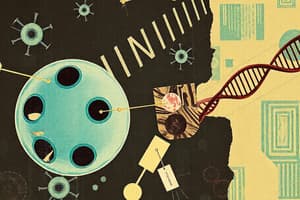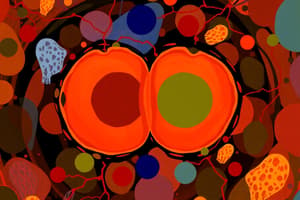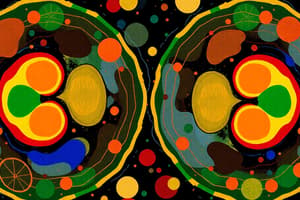Podcast
Questions and Answers
What is the primary reason cells divide?
What is the primary reason cells divide?
- To produce energy for the cell
- For growth and repair (correct)
- To eliminate waste products
- To exchange nutrients with other cells
During which phase of the cell cycle does a cell grow and develop the most?
During which phase of the cell cycle does a cell grow and develop the most?
- Interphase (correct)
- Mitosis
- Cytokinesis
- Anaphase
Which of the following accurately describes what occurs during interphase?
Which of the following accurately describes what occurs during interphase?
- Cells undergo mitosis.
- Chromosomes align at the center of the cell.
- DNA is replicated and the cell grows. (correct)
- The nuclear membrane disintegrates.
What happens to chromosomes during prophase?
What happens to chromosomes during prophase?
What is the result of mitosis?
What is the result of mitosis?
In which phase do the chromosomes align in the center of the cell?
In which phase do the chromosomes align in the center of the cell?
What occurs during cytokinesis?
What occurs during cytokinesis?
How many chromosomes do humans have?
How many chromosomes do humans have?
Flashcards
Cell Cycle
Cell Cycle
Series of events in a cell from one division to the next.
Interphase
Interphase
The period of cell growth and development between cell divisions.
DNA
DNA
Hereditary material (passed down from parents) in the cell's nucleus.
Chromosome
Chromosome
Signup and view all the flashcards
Mitosis
Mitosis
Signup and view all the flashcards
Prophase
Prophase
Signup and view all the flashcards
Cytokinesis
Cytokinesis
Signup and view all the flashcards
Cell division
Cell division
Signup and view all the flashcards
Study Notes
Cell Division
- Cells divide for growth and repair
- Cells also divide to get food, water, and remove waste from the body quicker
- The cell cycle is a repeating series of events that take place between one cell division to the next
- The cell cycle is constantly repeated
Interphase
- Interphase is a period of growth and development
- It is the longest phase of the cell cycle
- Some cells stay in interphase, such as nerve and muscle cells
Interphase: Stages
- Interphase is divided into three parts: G1, S, and G2
- G1 checkpoint—decides whether a cell can divide
- Checks environmental conditions
- Looks at the health and size
- If conditions are favorable, the cell proceeds to the synthesis phase; if not, the cell enters a resting period.
- Synthesis phase (S)—DNA is copied
- Each chromosome consists of two chromatids attached at the centromere
- G2 checkpoint—DNA replicates
- Checks for errors in DNA replication
Interphase: Three Things Happen
- Cell grows in size, making new additional structures
- The cell makes a copy of its heredity material (DNA)
- Produces structures needed for division (spindle fibers, centrioles)
Phases of Interphase
- First Growth Phase (G1):
- Cell grows rapidly
- Carries out everyday functions
- Synthesis Phase (S):
- Cell’s DNA is copied
- Second Growth Phase (G2):
- Assembles hollow microtubules
- Microtubules move chromosomes during mitosis
Chromosomes (Basic Structure)
- Chromosomes contain DNA
- A chromosome is made up of two chromatids connected by a centromere
- Each end of a chromatid is called a telomere
Chromosomes (Information)
- Humans have 46 chromosomes
- Carrot has 18
- Cats have 32
- Dogs have 78
- Earthworms have 36
- Fruit fly has 8
- Chimpanzees have 48
- Adders' tongue fern has 12
Control of Cell Cycle: Checkpoints
- There are three checkpoints
- G1 Checkpoint—decides if a cell can divide
- Based on the environmental conditions, health and size
- If favorable, conditions for S phase occur, else cell enters a resting phase
- G2 Checkpoint—checks for DNA replication errors
- If passed, mitosis occurs
- Mitosis Checkpoint—signals the end of mitosis, and G1 phase starts again
Control of Cell Cycle: When Checkpoints Fail
- Cancer occurs—uncontrolled cell growth
- Mutation missed by checkpoint—causes overproduction of growth hormone
- Damage to a cell—causes cells to constantly repair
Mitosis
- Mitosis is the division of the nucleus
- Results in two identical nuclei
Four Stages of Mitosis
- Prophase
- Metaphase
- Anaphase
- Telophase
Prophase
- Chromatin condenses to form chromosomes
- Centrioles move to opposite ends of the cell
- Spindle fibers form a bridge between the ends of the cell
- Nuclear envelope breaks down
Metaphase
- Chromosomes line up in the middle of the cell
- Chromosomes attach to spindle fibers by a centromere
Anaphase
- Centromeres split
- Chromatids separate to become chromosomes
- Chromosomes move to opposite cell ends
- Cell begins to stretch
Telophase
- Chromosomes stretch out
- New nuclear envelope forms around each region of chromosomes
Cytokinesis
- The cell membrane pinches in around the middle of the cell
- The cell splits into two daughter cells
- Each daughter cell has an identical set of chromosomes and half the organelles.
- Usually starts around the same time as telophase
Cytokinesis in Animal Cells
- Cell membrane pinches together around the middle to form two new cells
- Each daughter cell gets about half the organelles
Cytokinesis in Plant Cells
- Cell plate forms down the center of the cell
- Cell plate develops into a cell membrane
- New cell walls form around the cell membrane
DNA
-
Deoxyribonucleic acid
-
Heredity material passed on from parents
-
Found in the nucleus as chromatin
Studying That Suits You
Use AI to generate personalized quizzes and flashcards to suit your learning preferences.




